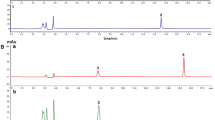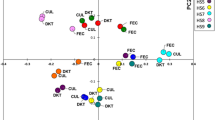Abstract.
Colonic bacteria were screened for bacteria involved in the conversion of phytoestrogens. A gram-positive anaerobic bacterium, strain HGH 136, capable of conversion of the isoflavonoid daidzein, was isolated and identified as a Clostridium sp. The bacterium cleaved the C-ring of daidzein to produce O-demethylangolensin (O-Dma). This compound was identified by comparison of the HPLC retention time and UV spectrum of the metabolite with chemically synthesized O-Dma. The identity of the metabolite was confirmed by liquid chromatography-mass spectrometry and NMR using synthetic O-Dma as a standard. The bacterium incubated with synthetic dihydrodaidzein also produced O-Dma. After 3 days of incubation, 28% of added daidzein and 12% of added dihydrodaidzein were converted to O-Dma. This is the first study in which an anaerobic bacterium involved in the ring cleavage of daidzein to produce O-Dma has been identified.
Similar content being viewed by others
Author information
Authors and Affiliations
Additional information
Electronic Publication
Rights and permissions
About this article
Cite this article
Hur, HG., Beger, R.D., Heinze, T.M. et al. Isolation of an anaerobic intestinal bacterium capable of cleaving the C-ring of the isoflavonoid daidzein. Arch Microbiol 178, 8–12 (2002). https://doi.org/10.1007/s00203-002-0414-6
Received:
Revised:
Accepted:
Issue Date:
DOI: https://doi.org/10.1007/s00203-002-0414-6




